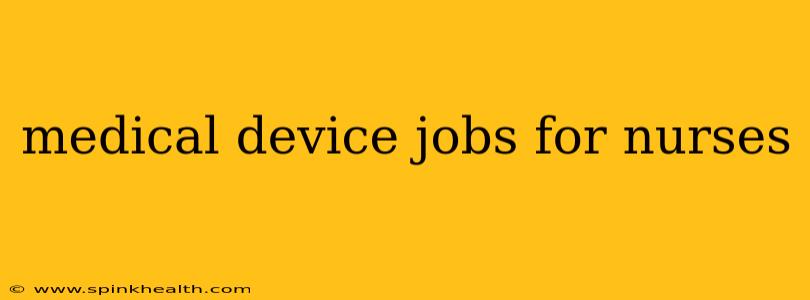For nurses seeking a change of pace, a career working with medical devices offers a fascinating blend of clinical knowledge and technological innovation. It's a field ripe with opportunity, allowing nurses to leverage their expertise in a new and exciting way. But what exactly are these jobs? Let's explore the possibilities and answer some common questions.
What Types of Medical Device Jobs are There for Nurses?
The world of medical devices is vast, offering diverse roles for nurses with varying levels of experience and specialization. Imagine yourself, not just caring for patients, but actively shaping the technology that improves their lives. This isn't a hypothetical; it’s the reality for many nurses.
Here are a few examples:
-
Clinical Specialist/Educator: These nurses act as liaisons between healthcare providers and medical device companies. They train healthcare professionals on the proper use and maintenance of devices, troubleshoot technical issues, and provide clinical expertise. This role often involves travel and presentations, making it ideal for nurses who enjoy interacting with others and sharing their knowledge.
-
Regulatory Affairs Specialist: With a strong grasp of clinical practices and regulatory guidelines (like FDA regulations), nurses in this area help medical device companies navigate the complex process of getting new devices approved and on the market. It's a challenging but crucial role in ensuring patient safety.
-
Sales Representative: Nurses with strong interpersonal skills can thrive in medical device sales. They leverage their clinical understanding to effectively communicate the value of devices to healthcare professionals, ultimately influencing purchasing decisions. This often includes building strong relationships with key decision-makers.
-
Clinical Research Associate (CRA): CRAs are involved in the clinical trials phase of medical device development. Nurses in this role monitor the safety and efficacy of new devices, collecting data, and ensuring compliance with research protocols.
-
Quality Assurance Specialist: In this crucial role, nurses help ensure that medical devices meet high standards of quality, safety, and performance. This may involve auditing manufacturing processes, reviewing documentation, and contributing to continuous improvement efforts.
-
Technical Writer: Nurses can use their clinical expertise to create clear, accurate documentation for medical devices, including user manuals, training materials, and regulatory submissions.
What Education or Experience Do I Need?
The specific requirements vary greatly depending on the job, but generally, a nursing background is a strong foundation. Many roles prefer candidates with a Bachelor of Science in Nursing (BSN) and several years of clinical experience, particularly in relevant specialties. For some positions, additional certifications or advanced degrees (like a Master's in Nursing or a related field) may be beneficial.
What are the Salary Expectations?
Salary expectations for nurses in the medical device industry are competitive and often higher than traditional bedside nursing roles, especially with experience and specialized skills. The specific salary depends on various factors, including location, experience, education, and the specific role. Researching salary data for similar roles in your geographic area can give you a realistic idea.
How Can I Find These Jobs?
Networking is key! Attend industry conferences and connect with professionals in medical device companies. Online job boards such as LinkedIn, Indeed, and specialized healthcare job sites are valuable resources. Tailoring your resume and cover letter to highlight relevant clinical experience and transferable skills is also essential.
What Skills are Most Important?
Beyond clinical knowledge, several soft skills are highly sought after:
-
Communication: Excellent written and verbal communication skills are essential for interacting with colleagues, healthcare professionals, and patients.
-
Problem-solving: The ability to analyze situations, identify problems, and develop solutions is crucial in troubleshooting technical issues and improving processes.
-
Critical thinking: Nurses in this field need to critically evaluate information, make informed decisions, and assess risks.
-
Teamwork: Collaboration is essential in many medical device roles, requiring nurses to work effectively with diverse teams.
Is a Career in Medical Devices Right for Me?
If you're a nurse who enjoys a dynamic work environment, thrives on solving problems, and wants to use your clinical skills in a new and innovative way, a career in medical devices might be a perfect fit. It offers a unique opportunity to contribute to healthcare advancements while maintaining a rewarding and challenging professional life. Consider your strengths, interests, and career goals to see if this path aligns with your aspirations.

